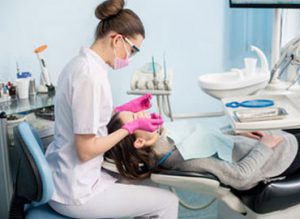
In general, oral hygiene is very important but even more so when you have braces! Good oral health can help to prevent bad breath, tooth decay, gum disease and other health problems.
It’s important that your mouth is free of any infections when you get your braces and your orthodontist will check this before attaching your braces. To avoid any interruption in your orthodontic treatment, it’s vital that you keep your mouth as clean as possible and uninfected.
Here’s our top tips on how to maintain your oral hygiene while wearing braces.
You can use a manual or electric toothbrush when brushing your teeth and braces. The most important thing is to brush as thoroughly as possible.
The ideal situation would be to brush your teeth with toothpaste or fluoride every time after you eat. Fluoride helps to protect your teeth’s enamel but avoid whitening products at all cost, since this can cause a colour difference of your teeth once the braces have been removed.
Start with your top teeth and hold your toothbrush at a 45-degree angle against your brackets. Use small circular movements to brush along your upper teeth and make sure you cover the teeth, brackets, and wires. Follow this by brushing the inside of your teeth that has a flat surface and then repeat the process on your bottom teeth. If you still have some food stuck in-between your teeth, use an interdental brush to reach between in the small gaps.
That’s right, flossing is still important when you have braces. Use about 20cm of floss wrapped around your fingers and floss between the wire and teeth. Gently move the floss between the teeth to remove plaque and food bits.
After you’ve brushed and flossed your teeth and braces, always remember to check it properly to see if you’ve cleaned everywhere.
When your brackets or wires rub against the inside of your mouth it can cause pain or discomfort, so once you’ve cleaned your mouth thoroughly, use small balls of dental wax and smooth it over the parts of the braces that are causing the irritation.
5. Snacking
It’s hard to brush your teeth every time you snack, so try to avoid eating in-between meals. If you really want to snack, make brace-friendly choices, or eat sugary snacks straight after you’ve eaten and just before you brush your teeth.
6. Change Your Toothbrush
Did you know that dentists recommend that you replace your toothbrush or toothbrush head every three months? If you have braces, the bristles may even wear down faster than three months so make sure you replace them when you see that the bristles are no longer straight.
7. Visit the Dentist
Even though you might be visiting your orthodontist regularly, it’s not the same as a visit to the dentist. Make sure you visit your dentist at least every 6 months to get your teeth professionally cleaned.